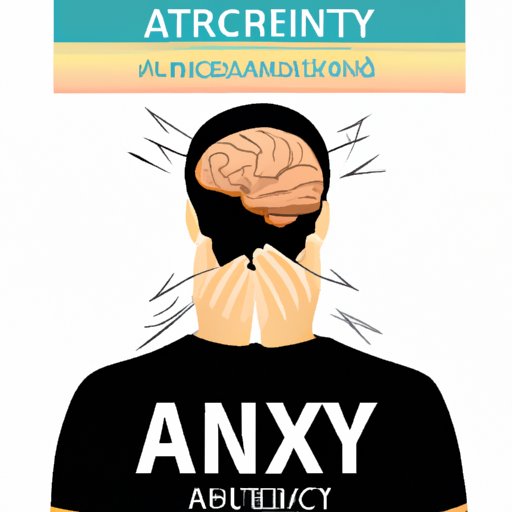
Introduction
Anxiety is a feeling of unease, worry, or fear that can be both emotional and physical. While it’s common to experience anxiety from time to time, it can become overwhelming and impair daily life when it takes a physical toll on your health. Anxiety can make people feel physically sick, which can be confusing and worrisome. In this article, we’ll explore the physical symptoms of anxiety, the gut-brain connection, long-term impacts of untreated anxiety, immunity, and strategies for managing anxiety-related symptoms of sickness.
Physical Symptoms of Anxiety
Anxiety can trigger physical symptoms such as nausea, dizziness, headaches, increased heart rate, chest pain, sweating, and muscle tension. These symptoms can mimic illnesses and make someone feel like they’re sick, leading to a cycle of anxiety and worry. It’s important to recognize when symptoms may be anxiety-related, so you can seek appropriate help. If you’re experiencing a physical symptom that recurs or persists, talk to your healthcare provider to rule out underlying medical conditions.
Gut-Brain Connection and Anxiety
The digestive system and the brain are connected, and anxiety can disrupt the gut-brain connection, leading to digestive issues such as bloating, stomach pain, and diarrhea. When you’re chronically anxious, your body is stuck in “fight or flight” mode, leading to the release of stress hormones that disrupt normal digestive function. To manage anxiety-related digestive issues, you can try relaxation techniques such as deep breathing, meditation, and yoga. You could also consider dietary changes such as eliminating trigger foods like caffeine and spicy foods.
Long-term Impacts of Untreated Anxiety
Untreated anxiety can have long-term effects on both physical and mental health. Chronic anxiety is linked to high blood pressure, heart disease, and immune system disorders. It can also contribute to mental health issues such as depression, substance abuse, and suicidal ideation. Seeking help for anxiety is essential in preventing long-term health complications. Treatment options include therapy, medication, and self-care practices like regular exercise and getting enough sleep.
Anxiety and Immunity
Research has shown that stress and anxiety can weaken the immune system, making us more susceptible to illness. Long-term anxiety leads to chronic stress, which can damage the immune system, making it harder for our bodies to fight off infection. It’s important to manage stress and anxiety to support a healthy immune system. You can try stress-relieving techniques such as journaling, talking to a friend, or practicing gratitude.
Strategies for Managing Anxiety-related Symptoms of Sickness
If you’re experiencing physical symptoms of anxiety, there are strategies you can use to manage them in the moment. For nausea, try sipping on ginger tea or nibbling on ginger candies. You could also try acupressure wristbands, which are designed to relieve motion sickness and nausea. For headaches, over-the-counter pain relievers like aspirin or ibuprofen can provide relief. You could also try relaxation techniques such as applying a cold compress to your forehead, getting a massage, or practicing deep breathing.
Conclusion
It’s common to feel physically sick when you’re experiencing anxiety. Anxiety can manifest in a variety of physical symptoms that mimic illness, making it difficult to recognize and manage. In this article, we covered the physical symptoms of anxiety, the gut-brain connection, long-term impacts of untreated anxiety, immunity, and strategies for managing anxiety-related symptoms of sickness. We encourage you to seek help if you’re experiencing physical symptoms of anxiety. With the right support and strategies, you can manage anxiety and support your overall health.





